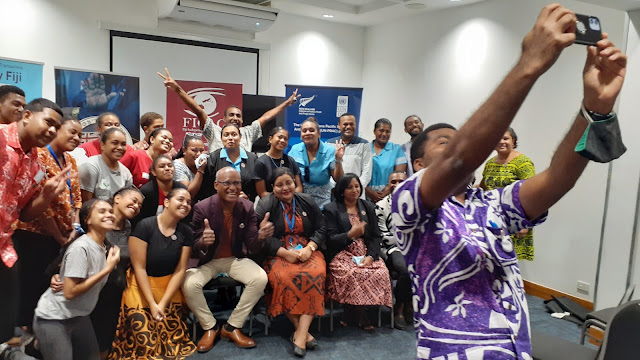5 ways the Pacific region can recover with integrity in 2021
By Joseph Veramu and Mariam Mathew
The Team from Fiji National University Dept of Ethics & Governance, Instructional Design Section, Pacific Youth Forum Against Corruption, Youths for Integrity, CLCT Integrity Fiji FICAC Fijian Parliament meeting at Tanoa Plaza to finalise the MOOC Online Free Anti Corruption Course that will be rolled out to the Pacific Region on Jan 18 2021
While
the whole world looks hopefully ahead to 2021 as a year of recovery from the
COVID-19 pandemic, the theme for this year’s International Anti-Corruption Day
on 9 December, “Recover with Integrity” has a particular relevance for the
Pacific region. In April this year, parts of the Pacific experienced a double
crisis, with Cyclone Harold wreaking destruction in Solomon Islands, Vanuatu,
Fiji and Tonga on top of the public health emergency. In addition to the economic
disruption, tragic loss of life and widespread damage, the Category 5 storm and
the virus have both created risks of further exploitation of governance systems
which were already weak.
In
the Pacific, as elsewhere, significant measures continue to be taken to respond
to the immediate threat of COVID-19 and help lives and livelihoods recover in
its aftermath. Several Pacific countries have declared a State of Emergency and
created economic stimulus packages, and international aid in the form of
funding and equipment has poured in to support governments implement their
response plans and strengthen national health systems.
With
these commendable efforts, however, comes a key challenge: limited transparency
and accountability in government responses. There have been allegations of diversions of funds and limited adherence to proper procurement processes, which creates opportunities
for bribery, kickbacks, and contract malfeasance. Without adequate access to
information, and enough capacity of oversight mechanisms, it is difficult to
verify or disprove these claims. In some countries, anti-corruption and right
to information laws are in place – but enforcement and implementation of the
policies that support them have been met with obstacles, including resource challenges
and, at the root of it, limited political will.
Through
a series of specific recommendations, civil society in some Pacific countries
have put pressure on governments to become more transparent and accountable.
But this pressure has not always been well received. State of Emergency powers
have been used to narrow the space for civil society to play its vital role in
combatting corruption and supporting sustainable development. Solomon Islands
for example recently announced that it would ban Facebook, a key tool for
engaging and sharing information with the public. There have also been concerns
over limited press freedom in several countries. Under
its State of Emergency declared earlier in the year, Vanuatu ruled in its
official gazette that media outlets can only publish stories about COVID-19 if
they get official authorisation.
Access
to information is a human right and crucial for citizens to make important
choices, particularly at a time of unprecedented crisis when the timely access
to accurate information is literally a matter of life and death. Social and
traditional media are also essential for allowing dialogue between citizens,
especially young people, and duty bearers, so that policy can best be shaped to
meet the most urgent needs of vulnerable populations.
At
the beginning of this year, some Pacific leaders adopted the ‘Teieniwa Vision’,
which is a commitment of their collective efforts to tackle corruption in all
levels of society. It recognises the importance of strong leadership and
building political will to unite against corruption. However, this vision is
yet to translate into bold deliberate collective action which would lead to a
reduction of corruption rates across the region.
During
the upcoming Pacific Islands Forum Leaders’ Meeting, key civil society groups are
calling upon Pacific leaders to do five things.
1)
Prioritise
the strengthening of national governance and integrity systems in order to
tackle corruption and achieve greater impact with pandemic response measures,
particularly for those most vulnerable.
2)
Review
progress on the Teieniwa Vision and agree on key steps to strengthen action in
2021 for greater government transparency and accountability.
3)
Urgently
establish inclusive national processes for auditing state of emergency finances
and procurement to date.
4)
Establish
and adequately resource key oversight mechanisms in order to build capacity and
let them function effectively.
5)
Last
but not least, ensure freedom of expression, and press freedom across the
region.
These measures would both empower
citizens and protect essential resources from corruption and malfeasance, supporting
the Pacific’s recovery and future sustainable development. Governments
throughout the Pacific have a duty to turn vision into action.
Joseph Veramu is PT Executive Director of Civic Leaders for
Clean Transactions (CLCT) Integrity Fiji and Higher Education Consultant at
FNU.
Mariam
Mathew is Regional Advisor for the Pacific at Transparency International



Comments
Post a Comment